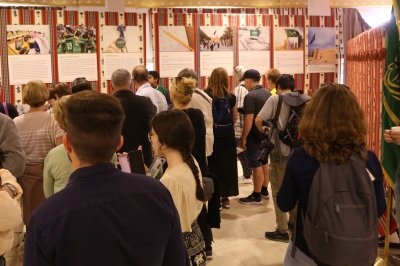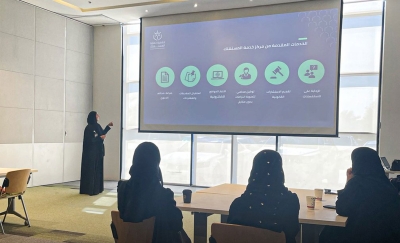
The King Salman Center for Disability Research is a scientific institution that supports programs and research aimed at addressing disability in the Kingdom of Saudi Arabia. The center was founded by the Custodian of the Two Holy Mosques, King Salman Bin Abdulaziz Al Saud (during his tenure as the Governor of Riyadh Province), with approval from the Ministry of Social Affairs (currently the Ministry of Human Resources and Social Development) on August 5, 1991.
Since its establishment, the center has organized six conferences and completed 366 research as of 2024.
Services offered by King Salman Center for Disability Research
The center offers services to the entire community, and people with disabilities in particular. The center develops scientific programs aimed at addressing disabilities, identifying their causes, and facilitating early intervention by relevant entities. These programs leverage research findings to aid planning and evaluation in various fields such as prevention, care, and rehabilitation. The center also seeks to alleviate the suffering of disability and improve the conditions of individuals with disabilities so they can contribute to building society.
Objectives of King Salman Center for Disability Research
The center aims to enhance institutional communication, advance technical systems, develop and qualify human cadres, and improve the quality of scientific research to address disabilities in various fields. The center also aims to provide qualitative training based on the results of research and studies, improve the quality of life for people with disabilities through innovative solutions, facilitate access to disability-related databases and information, and enhance the financial sustainability and investment of the center. Additionally, the center seeks to build strategic partnerships with stakeholders and bring scientific research findings to practical use.
Strategic plan of King Salman Center for Disability Research
The strategic plan of the center targets three main areas. The first focuses on building a comprehensive database based on scientific principles to provide accurate information about the percentage and distribution of people with disabilities in the Kingdom and the causes of various disabilities. The second addresses disabilities with high prevalence and invisible disabilities, such as learning difficulties, communication disorders, and mental health. The third focuses on advanced research, such as nanotechnology, robotics, and stem cell therapy.
King Salman Center for Disability Research's Universal Accessibility Program
In 2007, the center launched the Universal Accessibility Program for people with disabilities. At that time, the program supported over three million citizens with disabilities and the elderly (10 percent of the population), aiming to integrate them into society and ease their obstacles, so they can practice their daily lives normally, enabling them to fulfill their aspirations. The supervisory committee for the program established operational mechanisms for its implementation across government and private sectors and approved the necessary procedures for its practical application.
The Disability Welfare Law in the Kingdom mandates the adaptation of public transportation to ensure safe and secure mobility for people with disabilities. It also stipulates the establishment of engineering and architectural requirements, specifications, and standards to meet their needs.
The Universal Accessibility Program involves architectural, informational, technical, behavioral, and legal aspects. In 2008, the center conducted a comprehensive study of the program, focusing on evaluating and measuring the situation in the Kingdom and its compliance with the best international standards and practices. This included facilities, buildings, transportation means, tourism systems, products, and infrastructure.
The center has issued four key guidelines; namely: Built Environment Guidelines, Land Transportation Guidelines, Destinations & Places of Accommodations, and Marine Transportation Guidelines.
The center has signed agreements and memorandums of cooperation with governmental and private institutions to implement the Universal Accessibility Program in Saudi cities. Riyadh was declared the first disability-friendly city in the Kingdom in 2010.
'Awareness' publications at King Salman Center for Disability Research
King Salman Center for Disability Research has launched an educational story series titled 'Awareness' for children, in Arabic and English. These publications aim to raise awareness about disability types through short awareness-raising stories. The collection is available for free on the center's website, where interested individuals can read or download the stories directly.
The center's Program for Learning Difficulties
One of the center's key initiatives is the Program for Learning Difficulties, which focuses on high-prevalence and invisible disabilities. The program evaluates and enhances the operational processes, programs, and services provided to gifted children and their families by offering training and guidance, and developing an integrated system for day-care centers. This integrated system is based on international standards and specifications, including an early screening program for newborns that identifies the prevalence and types of endocrine and metabolic diseases in newborns across the Kingdom.
King Salman International Award for Disability Research
King Salman International Award for Disability Research was established to encourage scientific research on disability and persons with disabilities locally, regionally, and globally. The award covers five fields: health and medical sciences, educational and psychological sciences, rehabilitation and social sciences, technological applications related to disabilities, and universal accessibility.
The total value of the award is SAR2 million, with each winner receiving a financial prize, a certificate with their name, a summary of the work that qualified them for the award, and a medal. Across the three editions held in 2014, 2018, and 2022, seventeen individuals and entities have won the award.
Centers of Excellence Initiative at King Salman Center for Disability Research
Launched by the center, the Centers of Excellence Initiative is aimed at research and educational institutions to address the challenges facing the Saudi community in the disability field. The initiative targets centers and teams with fully integrated research infrastructure, providing support to conduct research projects and utilize infrastructure, such as equipment, human talents, and scientific capabilities, to produce innovative research and solutions.
The initiative focuses on various disability fields. The center is interested in scientific fields primarily concerned with the quality of life for individuals with disabilities. This includes the health field, which covers medical and biomedical engineering, biomechanics, medical and basic research related to disabilities and rehabilitation, therapeutic nutrition, healthcare for persons with disabilities, and preventing diseases and lifestyles that cause disabilities (genetic, congenital, or acquired).
It also focuses on the scientific field, including genes and heredity research, engineering sciences and applied research, and statistics and data sciences. The last one is the humanitarian field, which includes behavioral, psychological, social, and neurological research, education, training, and skill development.
King Salman Center for Disability Research's Research Groups Program
In 2022, the center launched the Disability Research Groups Program by forming collaborative research groups interested in disability-related health, medical, social, human, technological, and engineering studies and research. The center provides support for groups of up to SAR150,000, subject to specific application terms and conditions.
These terms include compliance of the projects with the research priorities of King Salman Center for Disability Research and the national priorities. Additionally, the group must have a Principal Investigator from an academic or research institution in the Kingdom with proven expertise and a track record in collaborative projects, research, and scientific publications, including prior publications in journals indexed in ISI databases. Original research published in the Web of Science - ISI databases is accepted.
Related quizzes

